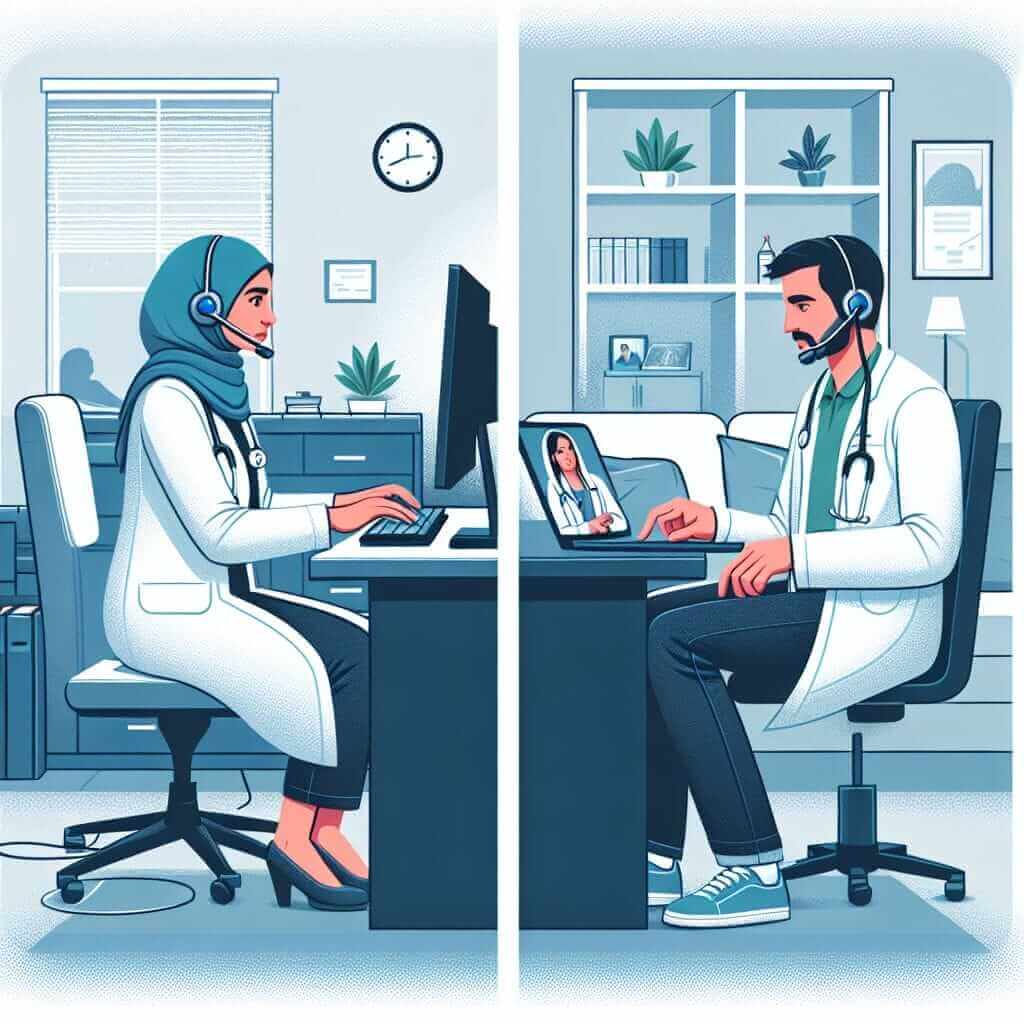The Reading section of the IELTS exam poses various challenges, with topics often reflecting current social trends and technological advancements. One such contemporary subject is the increasing reliance on telemedicine and its social implications. Understanding this topic can help test-takers tackle similar reading passages effectively, as it incorporates a blend of modern-day themes and intricate vocabulary. Given the rapid growth of telemedicine, it is a highly relevant topic that may appear in future IELTS exams due to its frequent discourse in modern contexts.
In this article, we will delve into the question, “What are the social implications of increasing reliance on telemedicine?” by providing a comprehensive reading passage, vocabulary, grammar points, and practice questions to help you enhance your IELTS Reading skills.
Practice Reading Passage: Telemedicine and Its Social Implications (Medium Text)
Telemedicine, the remote diagnosis and treatment of patients via telecommunications technology, has seen a significant surge in usage due to multiple factors, including the recent global pandemic. This shift toward digital healthcare services carries profound social implications, transforming not only how medical care is delivered but also how it is perceived and accepted by society.
Growing Accessibility
One of the most prominent advantages of telemedicine is its ability to increase access to healthcare, particularly in underserved and rural areas. Patients who previously faced geographical barriers to receiving medical attention can now consult with specialists from the comfort of their homes. This has led to a more inclusive healthcare system, potentially reducing health disparities among various socio-economic groups.
Changes to the Doctor-Patient Relationship
While telemedicine can enhance accessibility, it also alters the traditional doctor-patient relationship. The personal connection that is often fostered through face-to-face interactions may be diminished. Some patients and professionals express concerns that the lack of physical presence could impact the quality of care and the ability to accurately diagnose and treat conditions.
Economic and Operational Benefits
From an economic standpoint, telemedicine offers significant cost savings for both providers and patients. Healthcare facilities can reduce overhead costs associated with in-person visits, such as staffing and space. Patients, on the other hand, save on travel time and expenses. However, these benefits are not without challenges. The initial investment in technology and training, as well as issues related to data security and privacy, can pose significant obstacles.
Equity and Privacy Concerns
Despite its potential, telemedicine may exacerbate inequalities in healthcare. Individuals lacking access to reliable internet or the necessary technological devices are at a disadvantage, potentially widening the digital divide. Privacy concerns also loom large, as the transmission of sensitive medical information over the internet can be vulnerable to breaches, raising questions about data protection and patient confidentiality.
Societal Adaptation
The acceptance and effective implementation of telemedicine require societal adaptation. Public perceptions and the willingness to embrace digital healthcare play critical roles. Educating both patients and healthcare professionals about the benefits and limitations of telemedicine is crucial for its sustained success.

Reading Comprehension Questions
Multiple Choice
-
What is a major benefit of telemedicine mentioned in the passage?
- a) Increased healthcare costs
- b) Decreased access to specialists
- c) Enhanced accessibility in rural areas
- d) Improved doctor-patient relationships
-
What challenge does telemedicine face regarding doctor-patient interactions?
- a) Increased face-to-face interactions
- b) Diminished personal connection
- c) Increased accuracy in diagnosis
- d) Stronger trust in medical advice
Identifying Information (True/False/Not Given)
- Telemedicine has reduced the need for in-person medical staff.
- All patients have equal access to telemedicine services.
- Telemedicine completely eliminates privacy concerns in healthcare.
Matching Headings
Match the following headings to the appropriate paragraph:
i. Economic Benefits and Challenges
ii. Societal Adaptation
iii. Growing Accessibility
iv. Doctor-Patient Relationship Changes
v. Equity and Privacy Concerns
Sentence Completion
Complete the sentences using words from the passage:
- Telemedicine can increase healthcare access, particularly in __ areas.
- A significant economic advantage of telemedicine is the reduction in __ costs for healthcare facilities.
Answer Key and Explanations
Multiple Choice
- c) Enhanced accessibility in rural areas
- b) Diminished personal connection
Identifying Information
- True
- False
- Not Given
Matching Headings
- Paragraph 1: iii. Growing Accessibility
- Paragraph 2: iv. Doctor-Patient Relationship Changes
- Paragraph 3: i. Economic Benefits and Challenges
- Paragraph 4: v. Equity and Privacy Concerns
- Paragraph 5: ii. Societal Adaptation
Sentence Completion
- underserved
- overhead
Lessons Learned
When handling a reading passage like the one above, it’s crucial to:
- Pay attention to the main idea of each paragraph to make accurate matching headings.
- Focus on the detail and not the general idea for True/False/Not Given questions.
- Understand the context to complete sentence completion tasks accurately.
Vocabulary
- Surge (noun): a sudden increase; /sərj/
- Disparity (noun): a great difference; /dɪsˈparɪti/
- Inclusive (adjective): including all the services or items normally expected or required; /ɪnˈkluːsɪv/
- Overhead costs (noun): ongoing expenses of operating a business (excluding direct labor/material costs); /ˈoʊvərˌhɛd kɒsts/
Grammar
Relative Clauses
Relative clauses give additional information about something without starting another sentence. For example:
- Telemedicine, which has seen a significant increase, can enhance accessibility.
Formula: [Noun] + , + [Relative Pronoun] + [Verb] + …
Passive Voice
The passive voice is used to focus on the action rather than who performs it. For example:
- Telemedicine has been embraced by many healthcare providers.
Formula: [Subject] + [auxiliary verb ‘be’] + [past participle]
Tips for Improving IELTS Reading Skills
- Practice Regularly: Engage with a variety of reading materials on contemporary topics.
- Expand Your Vocabulary: Regularly learn and review new words.
- Time Management: Practice under timed conditions to improve speed and accuracy.
- Understand Question Types: Familiarize yourself with the various question formats in the IELTS reading section.
By honing these skills, you will be better prepared to achieve a high score in the Reading section of the IELTS exam.